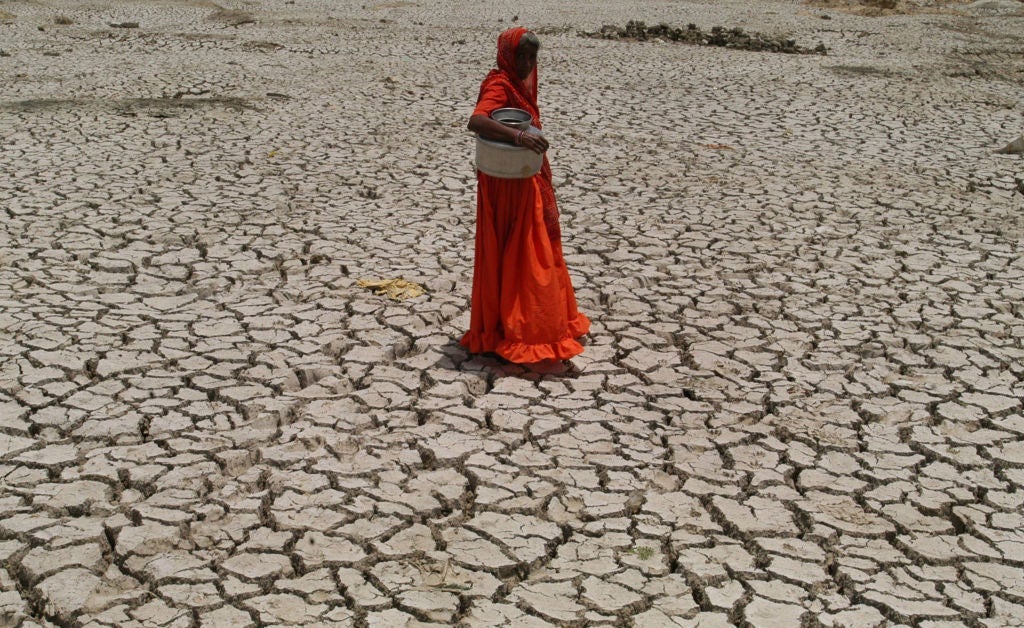
A new UN report has warned that current climate policies are putting Earth on the path to 2.7°C of warming by the end of the century, compared with pre-industrial levels.
Under current policies, the report estimates there is only a 50% chance that global warming will be kept to 2.6°C or below and a 10% chance that it could exceed 3.4°C.
Even if all pledges are implemented, including those that are currently conditional (for instance, on international assistance), the UN estimates that there would still be a 50% chance of the temperature increase exceeding 2.4°C.
Despite significant progress since 2010, carbon emissions are still on track to far exceed the level required to limit warming to 1.5°C, the goal specified under the 2015 Paris Agreement. Under current policies, global greenhouse emissions are expected to reach 55 gigatonnes of carbon dioxide equivalent (GtCO2e) by 2030.
That’s a substantial decrease from the 64GtCO2e that could have been expected under the policies in place in 2010, but still a long way off the 25GtCO2e needed to limit warming to 1.5°C or even the 39GtCO2e needed to limit warming to 2°C.
The countries that will suffer from global warming
A 2.5°C warmer world would see parts of large parts of Spain and the southern US experiencing temperatures above 38°C for a full month each year, according to climate models.
How well do you really know your competitors?
Access the most comprehensive Company Profiles on the market, powered by GlobalData. Save hours of research. Gain competitive edge.

Thank you!
Your download email will arrive shortly
Not ready to buy yet? Download a free sample
We are confident about the unique quality of our Company Profiles. However, we want you to make the most beneficial decision for your business, so we offer a free sample that you can download by submitting the below form
By GlobalDataAlmost all of Saudi Arabia, Iraq and northern India would experience such temperatures for more than 90 days annually. Wet bulb temperatures of over 30°C, which can be fatal, would be experienced for more than three weeks per year across most of Bangladesh.
The warning comes as COP26 climate talks begin in Glasgow, where the world’s governments are expected to negotiate further pledges to reduce greenhouse gas emissions.
"It is going to be very, very tough this summit,” Prime Minister Boris Johnson told a group of children in late October. “We might not get the agreements that we need. It’s touch and go.”
In October, the International Energy Agency called for $4trn in annual investment through 2030 in order to reach net-zero emissions by 2050 and keep global warming below 1.5°C while sticking to global development goals.
The report highlighted an expected surge in energy usage from infrastructure construction in developing countries, and called for global assistance to help these countries decarbonise their energy systems in time to meet this demand.
In 2009, wealthy countries pledged to finance $100bn in clean energy projects in the developing world each year by 2020. That target has not been met, and is now not expected to be met until 2023. In early November, the UK pledged an additional $1bn of funding for the scheme, but the funding is conditional on the country’s economic growth meeting expectations.
This article is part of a series that GlobalData Media is publishing to coincide with the next big UN climate conference, COP26, in Glasgow, from 1–12 November 2021. Our focus is on the opportunities and challenges for business of the transition to clean energy and net-zero greenhouse gas emissions. Other articles in this series include:
- Why success at COP26 is vital for business – Investment Monitor
- Is FDI making the climate crisis worse?– Investment Monitor
- Companies need to up their climate game. Can FDI help them? – Investment Monitor
- Business professionals see greenwashing as a major issue, but genuine net-zero action doesn’t have to mean red ink – Investment Monitor
- The success of COP26 rests on it providing an alternative to China’s Belt and Road Initiative – Investment Monitor
- The dilemma: How can Africa industrialise and reach net zero? – Investment Monitor
- Better late than never? Why COP26 matters, to FDI markets and beyond – Investment Monitor
- Opinion: Africa must not pay the price for the UK’s net-zero ambitions – Investment Monitor
- Grids largely overlooked ahead of COP26 – Energy Monitor
- Carbon markets see promise and peril from COP26 – Energy Monitor
- Overtourism and sustainability in the post-Covid, COP26 era: Should travel be only for the rich? – Railway Technology
- Inside Cervest’s plan to map the world’s climate risk – Verdict
- Shrinking the $9.2tn travel industry’s giant carbon footprint through sustainable tourism – Verdict
- Show us the money: Sustainable finance tech for COP26 to think about – Verdict
- Smart city start-ups rake in the green by boosting sustainability – Verdict
- What drinks brand owners should know about COP26 – sustainability spotlight – Just Drinks
- UK government wants ‘iconic’ British chargepoint design for COP26 – Just Auto
- It’s a fair COP26: Online shopping isn’t sustainable. But these start-ups can help – Verdict
- COP26 – Climate change and the automotive sector (1)– Just Auto
- COP26 panel – How is apparel tackling climate change?– Just Style
- The green revolution: What can you do?– Motor Finance Online
- Hello COP26: These robots can clean the oceans, but they need help– Verdict
- Food giants need to pick up pace on greenhouse gas emissions – Just Food
- How hospitals and the medtech sector are tackling the climate crisis – Medical Device Network
- ISSB: The need for comparable sustainability reporting standards – The Accountant Online
- In the run up to COP26 the ‘S’ in ESG takes off in LatAm – Retail Banker Online






